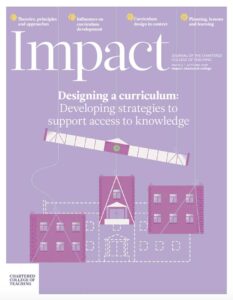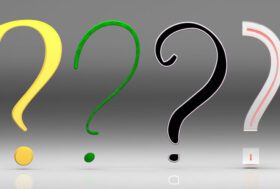Taking curriculum seriously

Curriculum is all about power. Decisions about what knowledge to teach are an exercise of power and therefore a weighty ethical responsibility. What we choose to teach confers or denies power. To say that pupils should learn ‘the best that has been thought and said’ is never adequate. Start the conversation, and questions abound: ‘Whose knowledge?’; ‘Who decides on “best”?’.
Such questions reflect concern about whether schooling reproduces inequalities or interrupts them. Such questions matter. But reducing knowledge to voice will not get us far either. The contentious questions – Which works of literature? Which historical stories? Which art? – cannot be resolved by some optimal blend of diversityThe recognition of individual differences in terms of race, ethnicity, gender, sexual orientation, socio-economic status, physical ability, religious beliefs and other differences, some nirvana of neutrality, as though distribution across the sources of knowledge or types of knower will settle things. No matter how redemptive of former injustice, no holy grail of content selection will be reached.
Nor does adding in preparation for the 21st century help. How can we decide what is relevant to the ever-shifting ‘now’? Worse, relevance quickly merges with perceptions of relevance and, before we know it, content is chosen for being engaging or deemed ‘relevant’ by the pupil. Then we have completely lost our moorings. At that point, we lose touch with the duty of including the next generation in a shared language of abstract concepts, in common tools for precise thought, in the possibility of objective knowledge underlying them and in the possibility of citizens appraising it. These things serve the rationalised sensibility on which participation in a democratic society depends.
Appeal to knowledge and skills is no corrective either. These terms invoke such diverse assumptions that discussions end up at cross purposes. And to suggest that knowledge is less important than skills is to ignore the way in which our knowledge changes us, including our curiosity and capacity for new knowledge.
As educators, we need something more coherent concerning the character of knowledge – its structure, its origin, its status as a set of truth claims (such as their revisability) and the relationship of teachers and pupils to that knowledge. How, how far and when can teachers or pupils participate in challenging or reaching those truth claims? In which subjects and under what circumstances must they just accept them (for now) as givens?
How can a senior school leader tackle these questions? School leaders need practical solutions; few have time to swallow philosophical tomes. Yet to shy away from big ideas is always a false saving. And intellectual resources exist that are rigorous, accessible and useful.
First, we have longstanding traditions of practice and debate within subject communities concerning ways of teaching the structure, status and origin of knowledge. Second, a relatively recent research programme arising from the sociology of knowledge advances the idea of ‘powerful knowledge’. In this article, I will reflect briefly on just one theme emerging from the first, which is further illuminated by the second, namely the curricular distinction between substantive and disciplinary knowledge.
Substantive and disciplinary knowledge
Substantive knowledge is the content that teachers teach as established fact – whether common convention, concept or warranted account of reality. You might want pupils to know of crotchets, percentages, the Treaty of Waitangi, Debussy or prokaryotic cells. In calling this ‘substantive’, we are treating the material presented as givens.
Disciplinary knowledge, by contrast, is a curricular term for what pupils learn about how that knowledge was established, its degree of certainty and how it continues to be revised by scholars, artists or professional practice. It is that part of the subject where pupils understand each discipline as a tradition of enquiry with its own distinctive pursuit of truth. For each subject is just that: a product and an account of an ongoing truth quest, whether through empirical testing in science, argumentation in philosophy/history, logic in mathematics or beauty in the arts. It describes that part of the curriculum where pupils learn about the conditions under which valid claims can be made, and associated conventions such as what constitutes evidence or argument in that subject.
In those subjects where content choices are potentially infinite and selections must be made, it is through due attention to the disciplinary dimension that pupils know that what I teach is not all that there is. In those subjects where truth is sought through argumentation, pupils learn that even the selection and juxtaposition of two facts in a narrative amount to an interpretation, and that interpretation can be conducted responsibly or irresponsibly, but never definitively. A successful history, geography, RE or literature curriculum, in which the disciplinary was visible, will leave pupils absolutely clear that even the curriculum itself, as they received it, was one such selection, and must not be confused with the whole domain.
This substantive–disciplinary distinction works to differing extents and in very different ways across subjects. The disciplinary dimension is barely relevant, for example, in school-level modern languages. Moreover, how it gains expression in a school curriculum varies widely. In history, pupils encounter historical scholarship in order to learn how historians participate in a social process of claim and counter-claim. But they can’t read scholarship without being drawn into the argument themselves. The date of the Treaty of Versailles is a given. Many events before and after the Treaty of Versailles are givens. But attributions of cause, consequence or significance to the Treaty of Versailles are not givens. The humblest of Year 7 history essays is elementary training in argumentation and produces legitimately different conclusions. Moreover, teacher-led, subject-specific research traditions have explored multiple ways of doing this well by blending secure substantive with rich disciplinary knowledge so as to refine pupils’ appreciation and practice of historical argument (Foster, 2013).
Is it the same in science? Not quite. The substantive and disciplinary distinction definitely holds. Pupils study scientific methods, understand degrees of certainty, conduct investigations. But in terms of pupils’ relationship to those processes and conclusions, there are differences. At school level, conclusions are not normally ‘up for grabs’ by pupils in quite the way they are in philosophy, literature or history, where argumentation itself is the method. In other words, each school subject stands in a slightly different temporal relationship to its real-world cognate of scholarly and professional knowledge production.
Therefore, when schools talk about pupils ‘being’ artists, historians or scientists, they are rarely talking about the same thing across subjects. In some subjects, we see frequent knowledge production processes (composing and creating; arguing and judging). In others, even those full of practising and doing within subject skills, the balance tilts towards knowledge reproduction, with less open-ended interpretation (a reason to avoid conflating ‘disciplinary’ with ‘skills’). This doesn’t mean that disciplinary knowledge is less important where less is ‘up for grabs’. It may just mean that pupils (for now) are learning more about how others have established truth claims. Even for a textbook or teacher to state, ‘Scholars are unsure whether trade in seventh-century Arabia…’ is to show disciplinary attentiveness by modelling responsible claims.
All this matters in whole-school leadership. ‘Substantive’ and ‘disciplinary’ are illuminating categories not only for understanding curriculum but also for grasping the implications of curriculum for teaching and assessment. Regarding teaching, they help senior leaders to interpret teaching activities in the light of an object. Before one can apply research into the efficacy of (say) pair/group discussion, one needs to establish what is being taught. Failure to do this has caused untold problems. A world of difference exists between a paired discussion designed to practise a facet of open argument derived from a particular discipline and a paired discussion designed for learning substantive content. In one, the dialogue teaches a disciplinary process; in the other, the rationale is constructivist pedagogy. They cannot be appraised in the same way. Regarding assessment, an understanding of substantive and disciplinary would have seen senior leaders questioning the use of level descriptions for formative assessment years earlier than actually happened. Each subject has its own pattern and interplay between learning substantive content and engaging with its origins or processes. The practice of treating progress as mini-versions of level descriptions and GCSE mark schemesCriteria used for assessing pieces of work in relation to particular grades has dangerously distorted subject structures and journeys.
The expression ‘knowledge-rich’ curriculum is normally associated only with substantive knowledge. This is understandable given that we’re emerging from an era in which mastering content was sidelined, even demonised, and given the attention now paid to research on the relationship between academic content knowledge and reading, on the vocabulary gap between advantaged and disadvantaged and on the role of knowledge in making subsequent learning possible (Willingham, 2017). But we cannot neglect the disciplinary dimension. This is achievable even in the primary phase. Our Year 4 pupils’ questions show that they are fascinated by Mendeleev’s cleverness in making the periodic table open and revisable, by van Leeuwenhoek’s worries about the Royal Society taking his microscope seriously, by the questions that geographers ask about borders and boundaries.
Powerful knowledge
The categories ‘substantive’ and ‘disciplinary’ are merely one cross-section of useful curriculum analysis but they are foundational. Their significance is further illuminated by a body of research within the sociology of knowledge that tackles education’s knowledge question within a progressive agenda for social justice (Rata, 2016) (Young, 2008). Associated with the concept of ‘powerful knowledge’, these theorists challenge the view that academic knowledge necessarily perpetuates disadvantage by remaining the preserve of the powerful forces that created it. Drawing on Durkheim, they argue that knowledge developed by academics in intellectual communities becomes independent of those socio-historical origins through its abstract and generalising tendencies. Because this specialised knowledge is not acquired or produced informally in everyday experience, entitlement to it through curriculum is vital (Young and Muller, 2016).
Not only does this knowledge offer the language of abstract concepts, but these precise concepts also become tools with which to imagine change. They enable humans to theorise possibility and think the un-thought (Wheelahan, 2010). To achieve this, a curriculum must enact processes of ‘epistemic ascent’ (Winch, 2013), by which concepts already understood by students are brought into new relations of abstraction and generality, giving the student yet more power to challenge, rethink and create. McPhail illustrates this with music (McPhail, 2014). He explains how without epistemic understanding, pupils are restricted to subjective experience of music. Discussing the complex relationships between music’s subjective and objective dimensions, McPhail shows how teachers can integrate students’ ownership of music’s affective power with access to knowledge fundamental to the conversations of the discipline.
While collaborating in building a trust-wide, knowledge-rich curriculum, we have found it useful to reflect on this body of work, not only regarding the power inherent in the abstractions of substantive knowledge, but also regarding each subject’s disciplinary dimension. Powerful knowledge theorists emphasise that specialised knowledge is emergent, provisional and revisable through continuing social processes such as scholarly research and critique. For pupils to learn how knowledge is formed and changed distinguishes a knowledge-rich curriculum grounded in ‘powerful knowledge’ from one merely ossifying a canon. In a stark prediction of three futures, Young and Muller (2016) contrast a Future 1 in which knowledge is fixed and tied to the social context that produced it, and a Future 3 whose radical potential harnesses the fertile, generative qualities of knowledge to give all citizens access to intellectual tools for rational change.
This article scratches the surface of debates that school and system leaders cannot ignore. Given its implications for democracy, curriculum is a serious business. We must engage with its provenance and properties.










